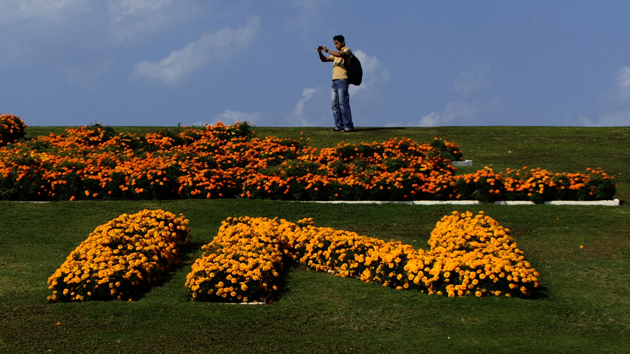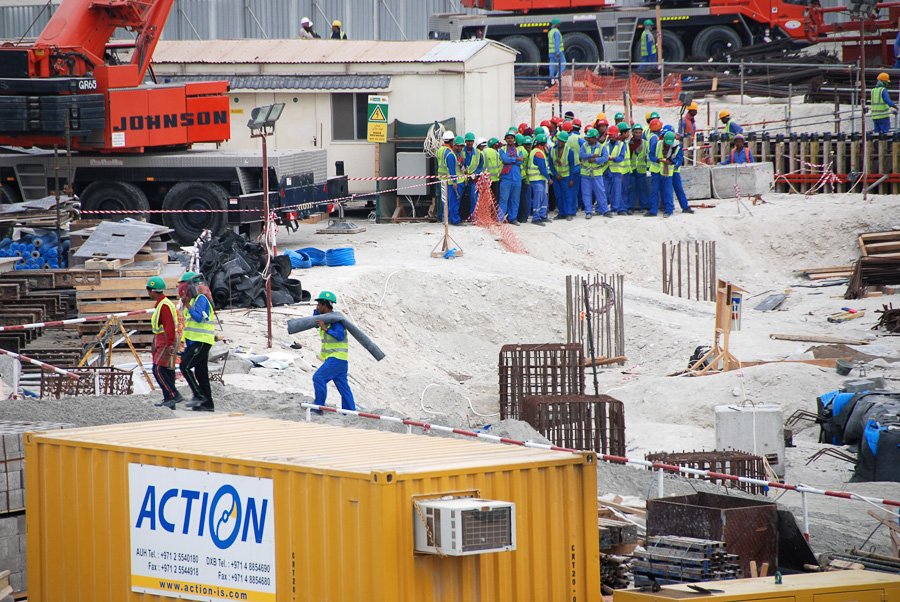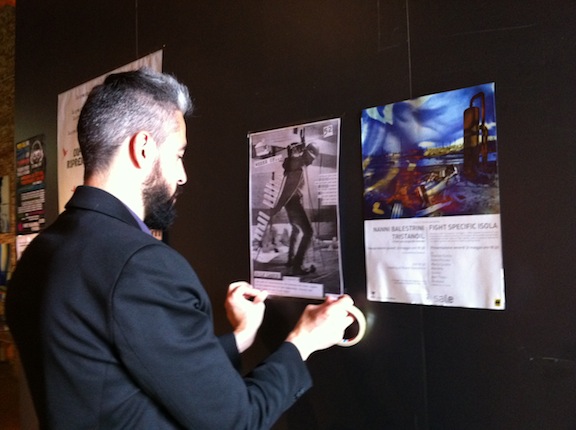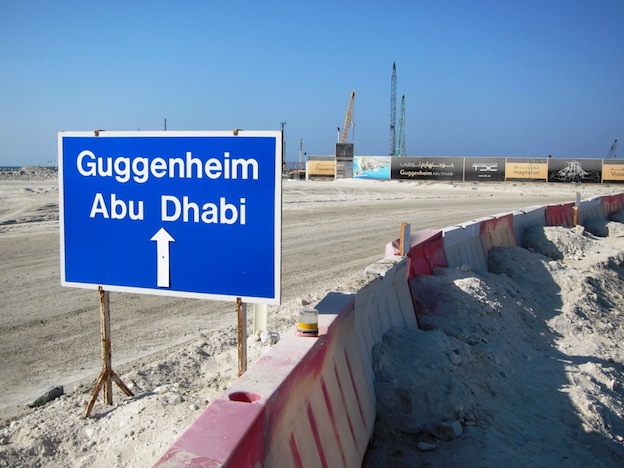The Islands of Evasion: Mariam Ghani

In April, Triple Canopy organized a forum called Critical Language, during which a group of artists, writers, curators, arts administrators, and other cultural workers discussed the “political implications and uses” of specialized language in the art world. The forum itself was inspired by the specific thread of that debate tweaked by Mostafa Heddaya’s March 2013 Hyperallergic article “When Artspeak Masks Oppression,” which analyzed the language deployed by the Guggenheim Abu Dhabi project and its representatives, and the subsequent response by Guggenheim director Richard Armstrong, also published by Hyperallergic. Continue reading The Islands of Evasion: Mariam Ghani
Arabtec workers strike, 460+ deported, police action
On May 19th, 2013 thousands of workers began a strike at Arabtec, the contractor in charge of the Louvre Abu Dhabi. The strike spread across several worksites in Abu Dhabi and Dubai, including at the Saadiyat Island Construction Village. Continue reading Arabtec workers strike, 460+ deported, police action
Saadiyat and the Gulf Labor Boycott: Ibraaz

“Saadiyat and the Gulf Labor Boycott,” is a collective essay by the Gulf Labor working group for Ibraaz Platform 005: http://www.ibraaz.org/essays/
Gulf Labor statement on Frieze New York
It has been Gulf Labor‘s position since its inception that the disregard of worker rights is a global phenomenon which requires resistance wherever it emerges, and wherever one is able to act. We have stated that this disregard for the safety, social conditions, and rights of workers is a problem not unique to Saadiyat Island in the United Arab Emirates. Continue reading Gulf Labor statement on Frieze New York
7 Jan 2013: GulfLabor Public Statement
GulfLabor calls on Guggenheim to respond to the PwC Report, and to all cultural institutions, including Louvre Abu Dhabi, to publicly announce steps to resolve labor rights issues on their sites.
DOWNLOAD as PDF: GulfLabor_Public Statement_1.7.13 Continue reading 7 Jan 2013: GulfLabor Public Statement
June 2, 2011: UPDATE on Guggenheim Boycott
2 June 2011
In May 2011, The Gulflabor coalition submitted to the Guggenheim Foundation and Museum and Tourism Development Investment Company (TDIC) of Abu Dhabi the following specific recommendations about the selection of an independent monitor:
a) No monitor should be selected who has, is, or will be providing services to any contractor or
subcontractor engaged in providing services to TDIC.
b) All efforts be made to select an independent monitor from a list provided by Human Rights
Watch (HRW). Alternatively, we recommend that one of the monitors from HRW’s list be hired as a consultant to help define a rigorous and transparent monitoring program, in conjunction with the independent monitor. On May 31, 2011, the Tourism Development & Investment Company (TDIC) announced that “it has appointed PricewaterhouseCoopers (PwC) as an independent auditor to monitor its contractors’ and subcontractors’ performance in the area of worker welfare.” Continue reading June 2, 2011: UPDATE on Guggenheim Boycott
May 12, 2011: UPDATE on Guggenheim Boycott
May 12, 2011
Dear all,
This past week, a number of signatories met with representatives from the Guggenheim Foundation and Museum and (by speakerphone) members of the Abu Dhabi Tourism Development & Investment Company (TDIC). The meetings permitted us to resume the conversations we initiated with the Guggenheim in June 2010 and to move forward on the issues that matter to all parties, namely to improve the conditions and rights for workers on Saadiyat Island in Abu Dhabi. Moreover, the meetings followed the visit in March 2011 by several signatories to the Saadiyat Island in Abu Dhabi. We were invited to the island by TDIC. Representatives from TDIC gave us a tour of the various projects on the Island. We also visited the Saadiyat Island Construction Village there.
In this past week’s meetings, we conversed with the Guggenheim and TDIC on how best to move forward with three issues raised in our petition: i) The independent monitor and a monitoring program; ii) Recruitment Fees; iii) Enforcement of TDIC’s announced Employment Practices Policies (EPP) and forthcoming additions. We also provided the Guggenheim with a number of specific recommendations, and hope to initiate dialogue regarding implementation.
We hope that significant new announcements on the development and implementation of a rigorous and transparent monitoring program, on recruitment fees, and on additional mechanisms to enforce fair labor policies on Saadiyat Island will be forthcoming.
Our boycott remains in place for now. Our actions are motivated by our hope that TDIC and the Guggenheim are trying to put in place on Saadiyat Island a cultural project with irreproachable labor standards. Our actions are intended as a generative contribution towards achieving these goals.
Sincerely
Gulflabor
More than 1000 Artists Call for Guggenheim Boycott over Migrant Worker Exploitation
March 26, 2011
Since the March 17th release of the Gulf Labor petition letter, it has been signed by more than 1100 people, the vast majority from the artworld. Clearly there is widespread support for the intent of the letter. The result is largely what the original signatories intended–to put public pressure on TDIC and the Guggenheim Foundation to remedy the labor exploitation on Saadiyat Island. We remain committed to working with the two institutions until we develop and implement concrete, detailed, and fully verifiable procedures for protecting the rights of the workers. To this end, dialogue is continuing, and the results will be posted here. In the meantime, the boycott remains in place.
Join the Artists and Sign the Petition! [http://www.ipetitions.com/petition/gulflabor]
Over 130 Artists Call for Guggenheim Boycott over Migrant Worker Exploitation
(New York, March 16, 2011) A group of leading artists, curators, writers, and others launched a boycott of Guggenheim Abu Dhabi today over the exploitation of foreign migrant workers building the museum on Saadiyat Island, the United Arab Emirates.
More than 130 international artists, curators, writers and others have signed a boycott to end all cooperation with the Guggenheim Abu Dhabi and are demanding that the Guggenheim Foundation and its Abu Dhabi partner take immediate and meaningful steps to safeguard the rights of the workers constructing the new branch museum on Saadiyat Island. Some of the artists who have signed the appeal have also decided to boycott other Guggenheim locations around the world until this issue is resolved.
“Artists should not be asked to exhibit their work in buildings built on the backs of exploited workers,” said Walid Raad, one of the artists boycotting the Guggenheim. “Those working with bricks and mortar deserve the same kind of respect as those working with cameras and brushes.”
In two extensive reports on the UAE, Human Rights Watch has documented a cycle of abuse that leaves migrant workers deeply indebted, poorly paid, and unable to defend their rights or even quit their jobs. The UAE authorities responsible for developing Saadiyat Island have failed to tackle the root causes of abuse: unlawful recruiting fees, broken promises of wages, and a sponsorship system that gives employers virtually unlimited power over workers.
After mounting criticism, the Guggenheim finally made a public commitment in September 2010 to protect the rights of laborers constructing its new branch. However the institution and, its Abu Dhabi partner, the Tourism Development and Investment Company (TDIC) have still not taken sufficient steps to better the conditions of workers.
On March 10, 2011, TDIC announced that it “is broadening its existing independent monitoring programme” and that it had revised its Employment Practices Policy (EPP) to provide that contractors “shall reimburse Employees for any Recruitment Fees paid by them, without deductions being imposed on their remuneration.” However, TDIC also stated that the monitor will examine only UAE and EPP violations, which of course exclude significant labor law and human rights protections guaranteed under international law. Furthermore, it has not indicated whether the monitor’s findings will be made public. With respect to the EPP statement that contractors will reimburse workers for fees, without enforcement mechanisms and a guarantee from TDIC and the Guggenheim, it remains nothing more than an unenforceable promise for which only workers bear the risk of loss.
“We support the building of cultural institutions on the Saadiyat Island but we feel that it is our responsibility to do what we can to ensure that the rights of workers are protected.” said Emily Jacir, a signatory.
The call followed an initiative by NYU faculty and students who are trying to secure similar protections for the construction workers who will be building the NYU Abu Dhabi campus, also on Saadiyat Island, known as the “Island of Happiness”.
Among those calling for the boycott are prominent artists Emily Jacir, Walid Raad, Yto Barrada, Mona Hatoum, Shirin Neshat, Akram Zaatari, Rirkrit Tiravanija, Janet Cardiff, Willie Doherty, Hans Haacke, Alfredo Jaar, Barbara Kruger, Antonio Muntadas, Paul Pfeiffer, to name a few.

